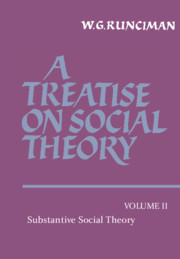Preface
Published online by Cambridge University Press: 10 January 2011
Summary
This volume can be read without reference back to its predecessor. But it does assume without further argument the methodology which it was the purpose of Volume I to expound. It assumes, that is, that the reportage, explanation, description and evaluation of social events, processes and states of affairs are different activities appealing to separate criteria. Like all works of social science, it accordingly raises descriptive and evaluative questions of a kind which never arise in the sciences of nature. But the substantive theory advanced in it stands or falls according to the standards of science in general – the accuracy of the observations which it reports, and the validity of the hypotheses of cause and effect which are invoked to explain them.
I take it also as read that the purpose to which a work of sociological theory is directed is different from a work of either history or anthropology as conventionally defined, even though there is no methodological distinction to be drawn between the three. This volume is concerned neither with the detailed narrative sequences which are the stock-in-trade of the historian nor with the detailed interrelations between institutions which are the stock-in-trade of the anthropologist. It is concerned only with the two questions: first, what distinctive kinds of society – which is to say, what modes and sub-types of the distribution of the means of production, persuasion and coercion – are possible at a given stage of evolution, and second, why it is that any given society has evolved into one rather than another of the possible modes and subtypes.
- Type
- Chapter
- Information
- A Treatise on Social Theory , pp. xi - xivPublisher: Cambridge University PressPrint publication year: 1989

